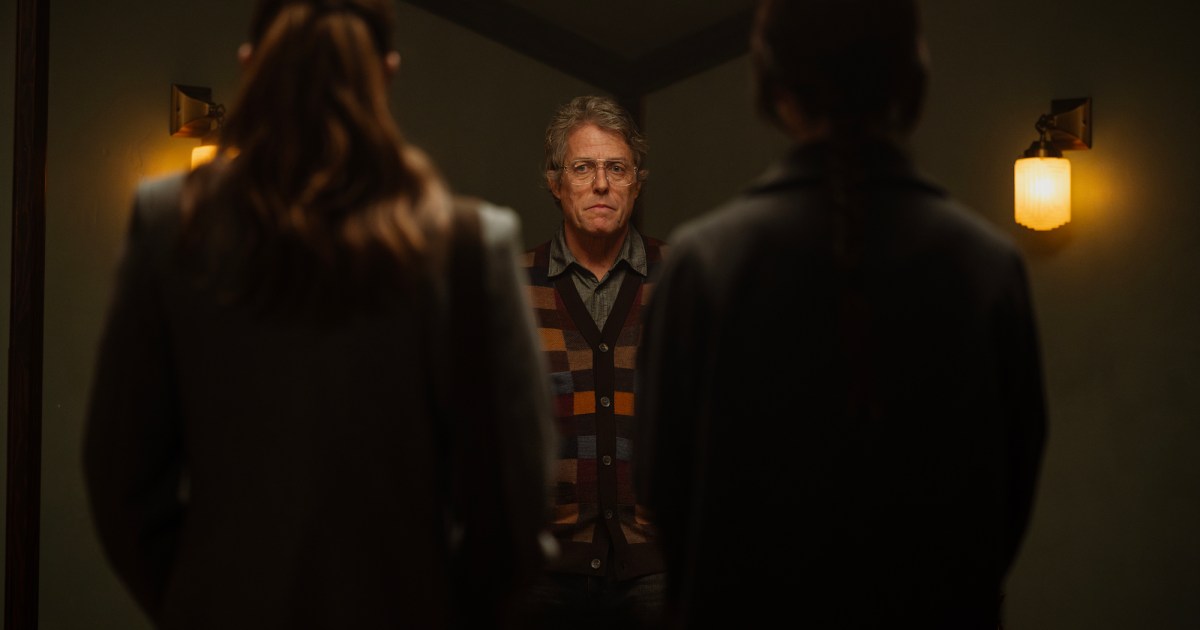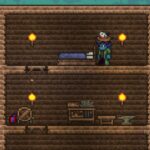Scott Beck and Bryan Woods have tackled deadly aliens in A Quiet Place, vicious dinosaurs in 65, and the titular mythical creature in The Boogeyman. For their next act, the duo challenged themselves to scare audiences with words, not monsters, in Heretic, A24’s new thriller in theaters everywhere. Two Mormon missionaries, Sister Barnes (Sophie Thatcher) and Sister Paxton (Chloe East), knock on the door of Mr. Reed (Hugh Grant) and ask if they can speak to him about the Church of Jesus Christ.
An excited Mr. Reed obliges and invites the girls inside for some conversation, learning, and a slice of pie. What begins as friendly banter transforms into an interrogation as Mr. Reed challenges the girls’ faith and beliefs. Barnes and Paxton are trapped, and the only way out is to play Mr. Reed’s treacherous games.
In an interview with Digital Trends, Beck and Woods spoke about their relationship with religion and how they created a horror movie around dialogue.
Note: This article has been edited for length and clarity.
Digital Trends: Whose idea was it to have a fast food debate in the middle of a movie about religion? To some, that is just as important [as religion].
Scott Beck: Oh, I mean that is our history of knowing each other for almost 30 years now. I think we’ve had many debates over our favorite fast food.
Bryan Woods: What’s your favorite fast food?
I actually like Wendy’s. I think Wendy’s might be one.
Woods: Pretty good, right?
Yeah. Can’t go wrong with McDonald’s. In defense of Taco Bell, that’s what I get on Sunday nights. As soon as this interview is over, I’m going to get it.
Woods: [laughs]
Beck: That’s awesome. Taco Bell is usually like a once-a-year occurrence for us, but since making this movie, it’s upped itself to twice a year.
I get it. The stomach fights back.
Beck: Yes, it does. [laughs]
One of the lines that really stood out to me came from Mr. Reed when he was talking with Paxton and Barnes about research, and at the end, he said, “The more you know, the less you know.” I feel like that applies to a lot of things. As filmmakers, do you find that line to be true?
Woods: Yeah. You know what’s funny, speaking as filmmakers with that line, our writing process is we hear things in life. We experience things personally. We write them in notebooks, and then someday, they might materialize in a script. That line, “The more you know, the less you know,” was a line we heard when we were in college. We were in our 20s, and I think it was Roger Ebert who asked Martin Scorsese about religion because he’s made so many movies about Catholic guilt. He said, “The more you know, the less you know.”
And that was a haunting response to that question. I think the older we get, the more we relate to this idea that life is a mystery. What happens when you die is a source of a lot of anxiety for most humans. [laughs] It’s one of the great mysteries in the world, and as we get older, we’re trying to embrace the beauty in the mystery. Try to get past the terror in it because it’s pretty frightening.
Did you know that Sophie and Chloe had Mormon ties before casting them?
Beck: We found out so late into the process while we were honing in on them. It’s not a surprise to us, in retrospect. During the casting process, we had a flood of people who wanted to make this movie, and we were very grateful that it was attracting that level of talent. But there was something so authentic about the way, during the casting process, Chloe and Sophie were embodying these performances. Every time we kept watching their tapes back or bringing them in for callbacks, they were capturing the Mormon dialect. And the slight discomfort of being partnered with another missionary that you are assigned to, and you don’t really know, but you’re trying to do your best for your shared mission.
The added benefit of having their experience in the Mormon relationship was staggering. It felt like the authenticity could then be used in the process of making the movie. There’s one scene where they’re going up the stairs early in the film as they’re going about their daily chores, where we’re seeing and hearing them say things that are fully authentic to their experience and their experience of living with Mormon friends and other people that have gone through missions. It’s the best you could hope for. But no, we had no clue [of their Mormon ties] when we were setting off and bringing them back again and again and again.
I liked how once things take a turn for them [Paxton and Barnes], they’re on the verge of breaking down at any second. You see their eyes watering during the whole second half. But they never have a full breakdown, which I found so fascinating. It’s almost like they were active hostages. Why was it important to portray them that way?
Woods: We really wanted to undermine your expectation of what a Mormon missionary is. We wanted to lean into the naïve façade and then show depth underneath the surface. That’s just our experience in personally knowing a lot of Mormon people and having met with Mormon missionaries. So we wanted to portray that.
Specifically to your question, it’s interesting. There actually was a deleted scene where Sister Paxton breaks down a little bit more than what you see in the movie. She gets kind of overwhelmed and more emotional. It felt not true, in retrospect. It was one of those things you write and put on the page, and you think this feels how she would react. Seeing it on film, it was kind of like, no, she’s a little tougher than that. It was important for us to hone that and make sure that the character always felt true.
You just want to reach in and give them a hug. Tell them everything’s going to be all right. Give them a tissue or something.
Beck: Yeah. Totally.
You have Hugh across from them, who you can tell is having the time of his life, especially with the juicy dialogue. In your conversations with Hugh, what were the main traits you wanted to hammer down for him to inject into Mr. Reed?
Beck: Well, I think in terms of traits, the really important thing that we all came to terms with very early on is he has to have a bit of charm that draws the audience in, just like it draws Paxton and Barnes in. And the safety, to a degree, that we’re just here to have a conversation. There needed to be a darker undercurrent, but that couldn’t show its head too early. It had to have an evolution.

One thing I remember Hugh always saying is that this guy, Reed, is having fun. It’s one thing when you have the script and you’re like, there’s darkness to this role. And he kind of imbued this role with that ounce of fun that allowed comic moments to come through. We always talked about this movie as each scene needed shifting sand underneath the characters’ feet, where you didn’t quite know where you stood at that moment. Are we in a safe situation, and it just feels a little odd, or is it actually dangerous?
You never could find out the answer to that question until, inevitably, it’s too late. So all of those conversations with Hugh very early on, months before we started shooting, we traded emails about the intonation of each scene, [and] sometimes the dialogue, so that finally, when he got to set, we didn’t need to have those in-depth conversations. They were already done, and he could just show up on set and really bring to life what he had studied and prepared so meticulously for.
It felt like a convo everyone had at Thanksgiving.
Beck: Yes.
I’m assuming one of you has had one?
Woods: Oh yeah. [laughs] We all have. I mean, it’s kind of the perfect time to release this movie in November. Just ahead of the holidays.
Beck: And right after the election too. You know, it’s right in that sweet spot.
Woods: A24 knows what they’re doing. … We genuinely hoped, like our biggest ambition for the movie, that it’s a theological conversation for two hours. Then, you leave the theater, and the hope is that you go to dinner afterward or drive home with your friends and family, and the debate continues.
With the thriller and the horror aspects, you can have someone with a mask and a weapon, and that’s scary. Or there’s jump scares when you film it. This movie is so dialogue-centric that it’s really the driving force of the tension and the horror. As writers, how were you able to weaponize the dialogue to serve as that primary source of thrill and horror?
Beck: Oh, thanks for saying that. We’re coming off the heels of doing A Quiet Place and Boogeyman and 65. These are movies that are built on the traditional cinematic techniques of jump scares or monsters and whatnot. And so for us, this was a swing in the complete opposite direction. How can you make dialogue and ideas about religion terrifying? To us, it was always about trying to make it personal, trying to make it about things that we’ve been struggling with, and in the pursuit of that, hoping that there are many other people out there who will see this movie that have been struggling with those same things or coming to similar conclusions.
Investigating the same darkness of why I believe what I believe, or why don’t I believe these things that other people believe. The permeating question that we’ve grappled with, but also the movie touches upon, is what happens when you die. The fear of that unknown, which to us, is one of the realest, scariest things that we all will be confronted with at some point.

With the house, I read you saw it as the fourth character. As they go deeper, they’re descending into hell. Did it [the house] always start as something that was going to go down and became this house of horrors?
Woods: We just wanted the house to be a bit of a mystery box. It starts off innocuous, safe, and almost benign. But then, the closer you look, there are little things that are weird. There are so many weird details that were in the set design that I don’t even think are in the movie. In the first living room, there’s wallpaper that’s peeling, and behind that wallpaper is a different wallpaper, which creates this sense that Reed has made up this room multiple times.
He’s always been changing and shifting it, depending on what he’s doing. We love the Dante’s Inferno-style descent that gets darker and darker and more real in terms of who Reed is. Like what he is beneath the surface. We wanted to keep surprising the audience and ourselves.
Phil Messina, our production designer, is one of the greatest of all time. He started his career on The Sixth Sense. You know, one thing we haven’t talked about is the room underneath the house that we actually refrigerated Exorcist-style to get the actors’ breaths to be genuine.
Beck: And it was incredibly uncomfortable in a productive way for all of us. I’m glad we didn’t shoot more of the movie in that room. It was pretty tortuous.

With how it’s filmed, I know you said Chung-hoon Chung, the cinematographer, was your weapon. What were your conversations about how you wanted to shoot the back-and-forth dialogue?
Beck: Our greatest fear, collectively, with Chung-hoon, was that this would just feel like a stage play. If we had just shot a stage play, then we should have just made a stage play. So it was a challenge for us to think of how the cinematic language evolves over the course of the film. That was very important to us — that it didn’t feel like we were replicating shot after shot. Chung-hoon really challenged us in the best way possible, and it made its way into the final film. He was like, “I think we should start the film off and shoot it very boring.” Like very static. Remove the instinct to move the camera.
Bryan and I initially were like, “Oh, yeah, we’ll shoot this park bench scene, and we’ll kind of dolly around here.” He was like, “No. Still. Boring. Let’s do that.” All of a sudden, it opened up the ability to figure out, when we start moving the camera, how to really chase the characters’ psychology. How do we segment this single character, and it feels like they’re being isolated, even when they’re in a room with all three of them there? Another aspect of it too was trying to find a way that we wouldn’t inhibit the performances.
So much of our love for cinema is filmmakers like Alfred Hitchcock or M. Night Shyamalan, who meticulously storyboard every single frame. That’s usually our instinct. But on this, we knew that would totally blockade a great performance from being what it could be. We don’t want to pigeonhole Hugh Grant into this tiny little box.

With Chung-hoon, we spent a lot of time figuring out how we become exacting with the camera but also being freeing, which seemed like two contradictory things. What we did in each room was lay down this dolly dance floor on the ground so we could have a moving camera go anywhere. We would let the performances go on for sometimes up to 10 pages of dialogue. We’d be shooting these really long takes, and then Chung-hoon would operate the camera himself.
Over the course of the scene, we’d have a radio on him. He would use his instincts, which were so beautiful and masterful. We’d be like, “OK. Now let’s get closer to Hugh.” We’d radio that in and create this bit of a dance between the camera and the performance in a way that still left Chloe, Sophie, and Hugh free to follow where the scene needs to go in the moment.
Heretic is now in theaters.
Read the full article here













